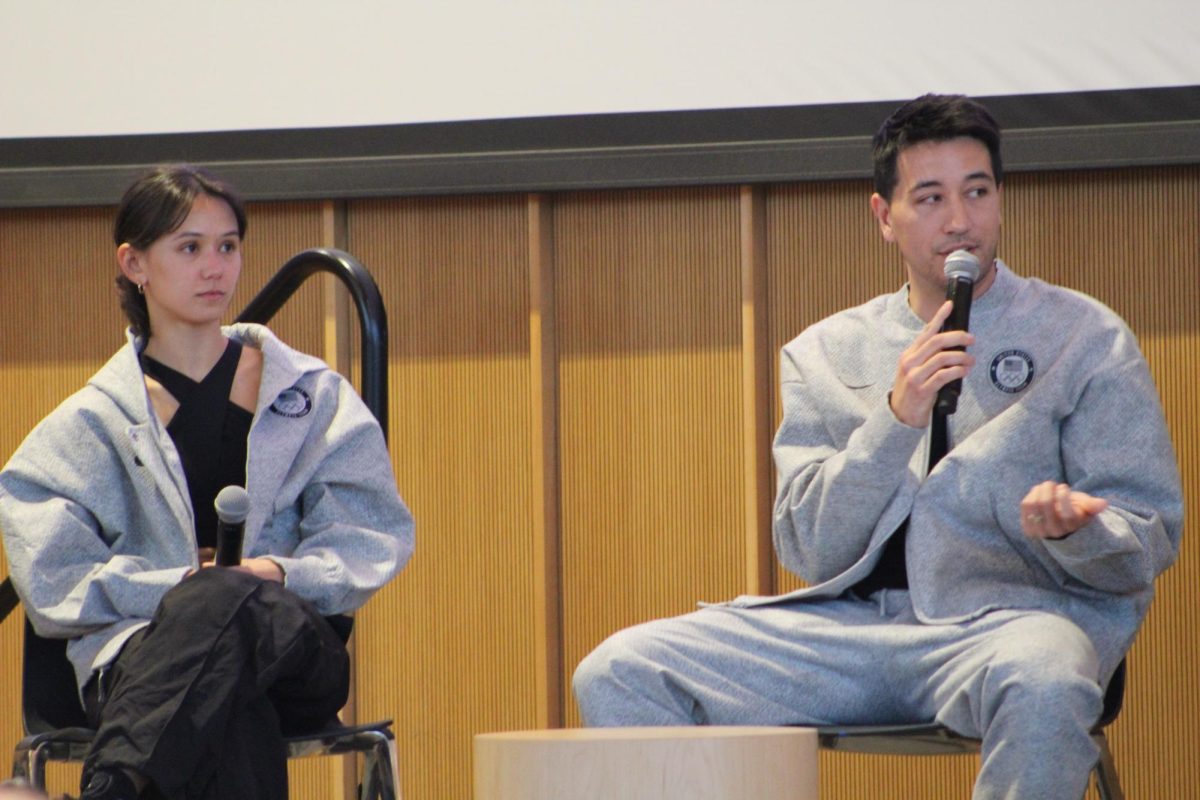On Monday, April 1, Olympic and World Foil Fencing Champions Lee Kiefer and Gerek Meinhardt had a question-and-answer session in the Student Union ballroom hosted by the University of Massachusetts Fencing Club.
Kiefer has been riding a career high by being the first American to win a gold medal in the individual event at the 2020 Tokyo Olympics. This March she also placed first in the Grand Prix in Washington, D.C. and is currently ranked number one in the world in women’s foil. Meinhardt is a 2019 team world champion and two-time Olympic bronze medalist in the team event.
Meinhardt and Kiefer, a married couple, competed for the first time in the 2008 Beijing Olympics and the 2012 London Olympics, respectively, while they were still undergraduates at the University of Notre Dame. Over the years, the pair have played a large role in bringing Team USA to the forefront of a sport that was long dominated by European teams like France and Italy.
The sport of fencing is made up of three disciplines: foil, épée and saber, each using a different type of blade and employing separate rules. Kiefer and Meinhardt compete in foil, the most common of the three disciplines, where the objective is to score points by striking the opponents torso.
During the event, moderated by three fencing club members, Kiefer and Meinhardt were asked questions about their favorite actions to use and the mindset they have while competing.
Keifer discussed how she changes strategy in the middle of a bout. “I am very simple mentally; I have different buckets of things that I can change…my most common thing is how are my intensity levels.”
She explained that if she notices herself advancing too aggressively or quickly when the score is down, she might try to switch up her approach to catch her opponent off guard and find an opening to get a touch. Changing techniques, such as her footwork or spacing, one at a time also helps in maintaining a steady mindset during her bouts.
“I feel like everyone always has the answers…we all know what we are capable [of] in our bodies,” Kiefer said. “It’s easy to get bogged down with expectations.”
When asked about how they feel being role models for young fencers, Kiefer said, “It’s an honor, sometimes it’s pressure…but overall, it’s really good to know this and practice kindness.”
Kiefer said her role models growing up in the sport were her female teammates, the people who cheered her on and also her “nemeses,” because they taught her how to push herself and stay focused.
She also shared a story from early in her career: after losing in the London Olympics, she almost stopped fencing all together. She added, however, that it was her college friends and Meinhardt who encouraged her to keep going.
Over the past 10 years, Meinhardt has been competing alongside roughly the same teammates, Alexander Massialas, Race Imboden and Miles Chamley-Watson. While this group has had a lot of success in competitions together, when asked about his teammates, Meinhardt said that he is now inspired by the younger fencers who are joining the national team as, “the next generation is really strong.”
The couple’s fencing journey tells an insightful story of persistence, determination and self-exploration. They now attend medical school together at the University of Kentucky on top of their fencing careers. They are currently on a leave of absence to train for the upcoming Summer Olympics. “Honestly, the results in fencing suffered a lot [when we started med school]…it was hard for us,” Meinhardt said.
Kiefer said balancing medical school and training taught her a great lesson in only controlling “the things you can control.” She said she focuses on nutrition and having a set routine because “come competition day, [it’s] one less thing you have to worry about.”
Both emphasized the importance of focusing on short-term goals to achieve long-term athletic improvements: “I always find small goals to work towards and it’s so fun,” Kiefer said. Perfecting and implementing specific actions is a large part of fencing training.
The pair are currently en route to the 2024 Paris summer Olympics with big goals in mind: “We are really excited to work with our teams,” Meinhardt said. “I think we are both capable of winning gold.”
This is the first non- tournament event that the UMass Fencing Club has put on. “One afternoon in October, I was sitting in the ILC and I was thinking about ways we could improve the events we do in our club,” Shivani Allada, head of fencing club public relations, said in an email. Five College members and the Amherst community at-large were in attendance.
“We wanted this event to be available to everyone in the community, so we made sure that the public was able to buy tickets as well,” Allada added. “Overall, this event took almost a full seven months to plan from start to finish.”
The money for the event was raised through a combination of alumni donations and fundraisers. “I hope for the future of the club [that] they will know that just because we are a club sport, doesn’t mean that our opportunities are limited,” Allada wrote. “We have the ability to shape our opportunities.”
The UMass Fencing Club will be heading to nationals in Virginia Beach this month.
Grace Lee can be reached at [email protected] and Kami Nguyen can be reached at [email protected].





















